Margin Call is a film released in 2011, directed by J.C. Chandor, who also helmed A Most Violent Year, a movie I thoroughly enjoyed.
This film explores the same narrative as The Big Short—the financial crash of autumn 2008 and credit default swaps or sub-primes—but takes a very different angle, more grounded, and realistic approach as their almost no exposition or real technical explanations.
We are thrust right into the midst of these traders’ professional lives, just one day before the crash. In this review, we’ll explore the message the movie is trying to convey.
The Economy is an Illusion

Most people like to believe that the economy is a concrete system governed by mathematical precision and logic. However, in reality—especially when it comes to the stock market and speculation—it closely resembles gambling and loopholes. While predictions are possible, much like in life, Murphy’s Law inevitably introduces chaos in the long run making high risk reward investment essentially a bet.
The true winners are stockbrokers, who earn commissions on every trade, guaranteeing they always profit, no matter how the market moves. Similarly, banks never truly lose when issuing credit—they secure the house as collateral while collecting substantial interest along the way.
Another type of winner is those who gain insight into the speculative market before others, allowing them to act ahead of the wave or understand intricate economic mechanics. Finally, seasoned experts like Buffett and Munger, who are masters of compounding wisdom over decades using strong logic and common sense.
Why stock brokers earn so much money?
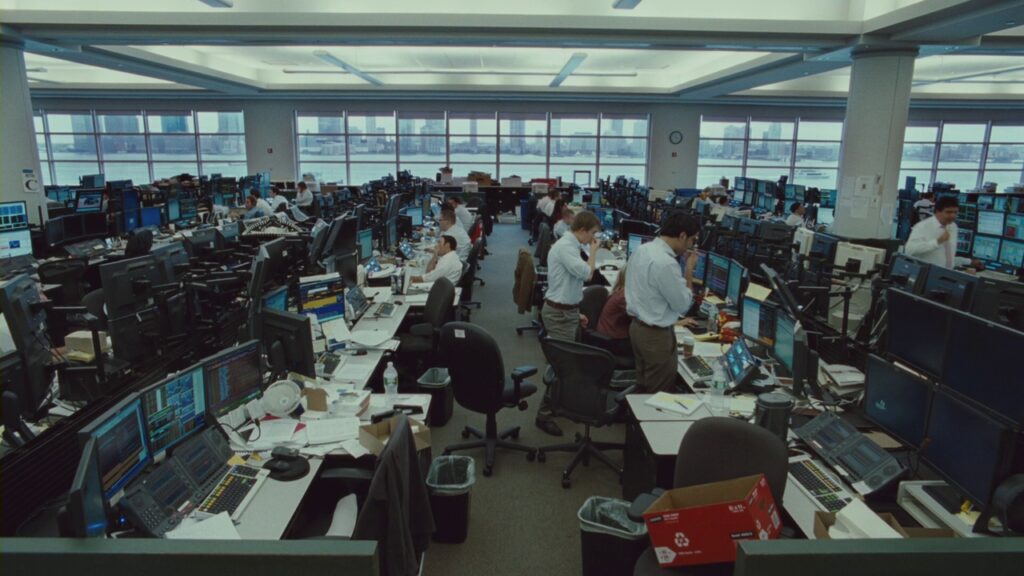
Essentially, they operate at the highest level of investment, collecting commissions on large-scale deals and corporate investments. In most cases, banks dominate this space through their trading divisions
of course by using citizens’ savings to gamble and earn interests. As evident from their presence in prime real estate, banks hold immense power, owning the most prestigious buildings in cities worldwide.
Since banks wield immense power, profitability, and influence, they can effectively shape tax policies on revenue, salaries, bonuses, and capital gains. Not only do they extract hefty commissions, but they also have legal avenues to optimize taxation, ensuring far better net returns compared to the average worker. They make the rules essentially as one of the most profitable institutions.
For example Hong Kong generally does not tax capital gains or capital repatriation. However, gains on the disposal of assets may be subject to profits tax if the disposal constitutes a transaction in the nature of trade (a factual determination).
The Casting : A Shark Tank
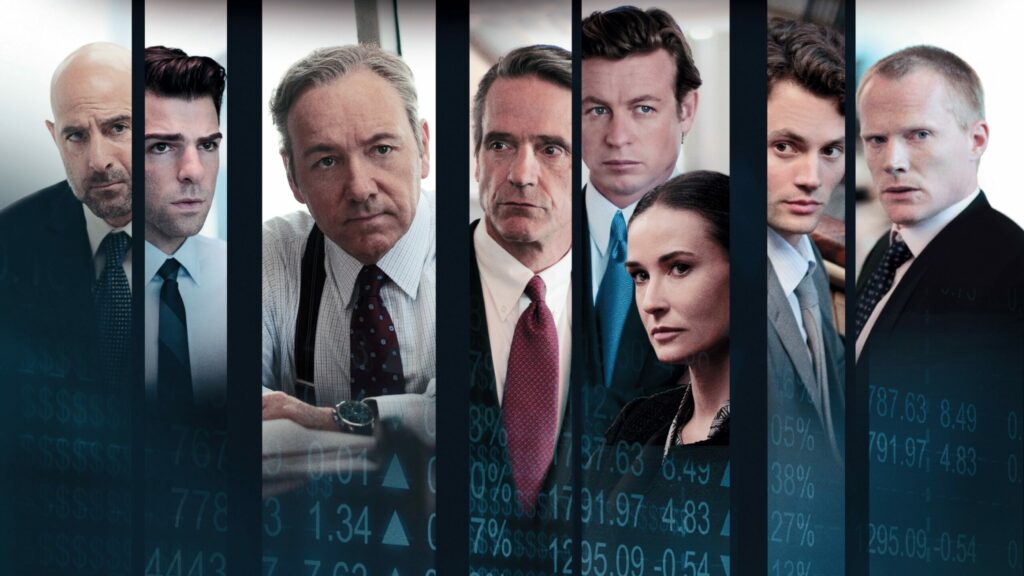
If I had to describe a real-life Shark Tank, this movie would be the perfect example. From the bottom to the top, it depicts an ecosystem of ruthless, highly competent, and sharp-minded individuals.
The lower you are in the hierarchy, the more vulnerable you are to emotional breakdowns. The higher you climb, the more composed, intimidating, and ruthless you become.
The first level of traders already consists of some of the most ruthless, career-driven individuals you might know. The next tier is on another level entirely, filled with near-legendary figures, with MIT prodigies Quant in between.
Demi Moore and Simon Baker’s characters resemble high-level politicians—strategic, calculated, and always playing the long game.
At first, I thought Kevin Spacey’s character was the ultimate alpha shark, but Jeremy Irons takes it even further—an apex predator with an unwavering, pragmatic view of the world. He operates like a commander-in-chief in the midst of a war.
I find their interactions brilliantly portrayed. There’s a prevailing sense of disagreeableness and assertiveness among them, which intensifies as one ascends the hierarchy and accumulates more wealth.
Each higher level is regarded with admiration, almost as if those above hold a legendary status. To be more accurate, it looks more like a mix of fear and authority. The further up the chain, the more adept they become at wielding power and confronting harsh realities but also cutting you in pieces if necessary.
One of the most revealing scenes is when Sarah Robertson attempts to avoid being sacked by John Tuld. However, it’s ultimately futile, as the decision has already been made for obvious reasons and they exist on entirely different levels of power and capability when it comes to threats.
It’s fascinating that Jeremy Irons voices Scar in The Lion King—a cunning, manipulative, and calculating old lion—as well as the villain in Die Hard. His charisma is undeniable, even if it’s not in the most admirable way. There’s an aura about him that commands attention.
What’s the perspective of a trader?

A trader’s mindset is fundamentally rooted in a zero-sum game view of the world—there must be winners and losers, aligning with the Pareto distribution. They are willing to do whatever it takes to come out on top, no matter what.
Money is the ultimate deciding factor in their lives. No passion, no emotional fulfillment, no sense of meaning. They are essentially like gamblers, who like competitiveness and high risk high reward type of environment.
This perspective fosters an incredibly cynical, yet arguably realistic view of the world. However, in the film, there’s a palpable fear of failure—of being seen as a loser or getting fired. There is also a common awareness of the illusion of money and its somewhat abstract mechanics. For instance, no one seems to fully grasp the draft outlined by Eric Dale and Peter Sullivan, who, interestingly, both have tangible diplomas and backgrounds leading to one infamous line:
John Tuld: Maybe you could tell me what is going on. And please, speak as you might to a young child. Or a golden retriever. It wasn’t brains that brought me here; I assure you that.
While talented traders may seem like mathematical geniuses or experts in physics, the reality is that the top traders are often skilled salespeople and managers. They excel at understanding people and know how to make talented individuals work for them or for money. At the end it’s ruthlessness that is the defining factor within the hierarchy.
Some characters even show glimpses of regret, longing for a more tangible profession where they can witness the direct, positive impact of their work. Like Eric Dale, which seems to be the most moral person inside the building as a risk assessment manager. Ultimately, money always has the last word.
The Perspective on Money

One of the most revealing moments in the film is when Will Emerson breaks down how he spent the $2.5 million he earned in a year of trading.
This is where you realize that, no matter how much money someone has, their habits remain fundamentally the same.
- Seth Bregman: Will, did you really make two and a half million last year?
- Will Emerson: Yeah, sure.
- Seth Bregman: How did you spend it all?
- Will Emerson: It goes quite quickly. You know, you learn to spend what’s in your pocket.
- Peter Sullivan: Two and a half million goes quickly?
- Will Emerson: All right, let’s see. So the taxman takes half up front, so you’re left with one and a quarter. My mortgage takes another 300 grand. I send 150 home for my parents, you know, keep ’em going. So what’s that?
- Peter Sullivan: 800?
- Peter Sullivan: All right, 800. Spent 150 on a car. About 75 on restaurants. Probably 50 on clothes. I put 400 away for a rainy day.
- Seth Bregman: That’s smart.
- Will Emerson: Yeah, as it turns out, ’cause it looks like the storm’s coming.
- Peter Sullivan: You still got 125.
- Will Emerson: Yeah, well I did spend 76,520 dollars on hookers, booze and dancers. But mainly hookers.
- Peter Sullivan: 76,5?
- Will Emerson: I was a little shocked initially, but then I realized I could claim most of it back as entertainment. It’s true!
It’s just a more luxurious version of the same routine—a nicer club, a better car, more expensive gifts, and tailored suits. But at the core, their lives follow the same structure: waking up early, working late, and squeezing in brief moments of enjoyment in between. That’s all there is to it.
Of course, they enjoy more comfort, security, and the possibility of an earlier retirement with greater certainty. However, the film doesn’t portray their lives as something anyone would willingly choose without the massive financial incentives. This stands in stark contrast to the artistic, culinary, sports industry, where passion often drives people regardless of the paycheck.
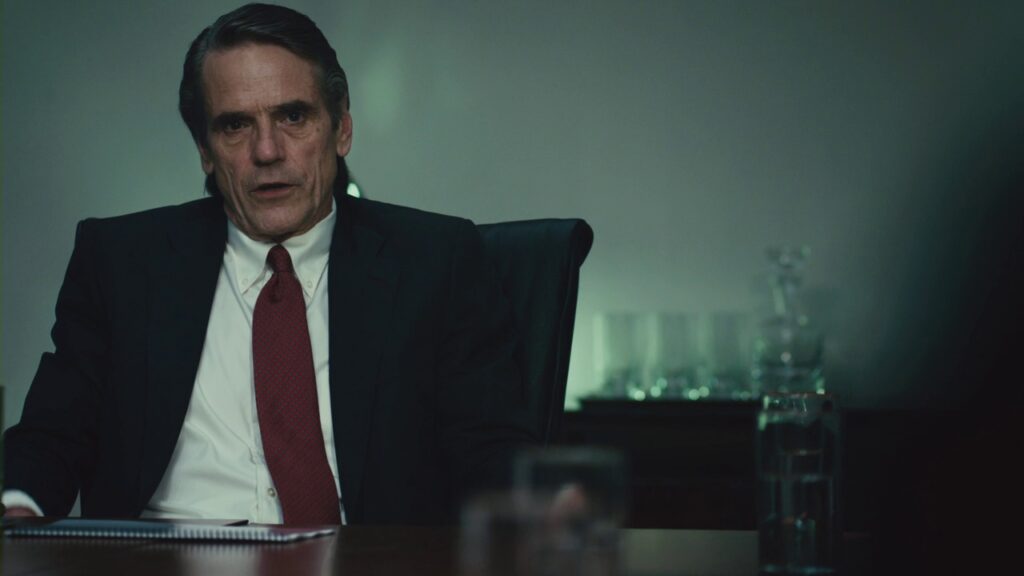
During the critical emergency meeting, Mr. Tuld states that there are only three ways to succeed: being first—possibly referring to dominating the market, being smarter—finding a way to think differently or work more efficiently, and finally, cheating—operating outside the rules, which he avoids for obvious reasons, as it would put him in jeopardy. This statement essentially summarizes how the world operates at every level, for everyone.
The metaphor of the music stopping or slowing down is a brilliant visualization of the money-making process—an endless rhythm that must keep playing at any moral cost, including betraying every customers and partners in the process.
- John Tuld: So, what you’re telling me, is that the music is about to stop, and we’re going to be left holding the biggest bag of odorous excrement ever assembled in the history of capitalism.
- Peter Sullivan: Sir, I not sure that I would put it that way, but let me clarify using your analogy. What this model shows is the music, so to speak, just slowing. If the music were to stop, as you put it, then this model wouldn’t even be close to that scenario. It would be considerably worse.
- John Tuld: Let me tell you something, Mr. Sullivan. Do you care to know why I’m in this chair with you all? I mean, why I earn the big bucks.
- Peter Sullivan: Yes.
- John Tuld: I’m here for one reason and one reason alone. I’m here to guess what the music might do a week, a month, a year from now. That’s it. Nothing more. And standing here tonight, I’m afraid that I don’t hear – a – thing. Just… silence

The end scene, where Mr Tuld, is enjoying his meal while everyone got laid off and bonuses after the storm and the crisis have hit them. Shows us how detached you have to be to be a CEO in this industry as opposed to managers like Sam Rogers.
John Tuld : So you think we might have put a few people out of business today. That it’s all for naught. You’ve been doing that everyday for almost forty years Sam. And if this is all for naught then so is everything out there. It’s just money; it’s made up. Pieces of paper with pictures on it so we don’t have to kill each other just to get something to eat. It’s not wrong. And it’s certainly no different today than it’s ever been. 1637, 1797, 1819, 37, 57, 84, 1901, 07, 29, 1937, 1974, 1987-Jesus, didn’t that fuck up me up good-92, 97, 2000 and whatever we want to call this. It’s all just the same thing over and over; we can’t help ourselves. And you and I can’t control it, or stop it, or even slow it. Or even ever-so-slightly alter it. We just react. And we make a lot money if we get it right. And we get left by the side of the side of the road if we get it wrong. And there have always been and there always will be the same percentage of winners and losers. Happy fucks and sad sacks. Fat cats and starving dogs in this world. Yeah, there may be more of us today than there’s ever been. But the percentages-they stay exactly the same.
For Tuld, it’s just another crisis to manage, another day in the office really. Money is merely an illusion, and he’d rather be on the winning side of it.
What is the role of traders?
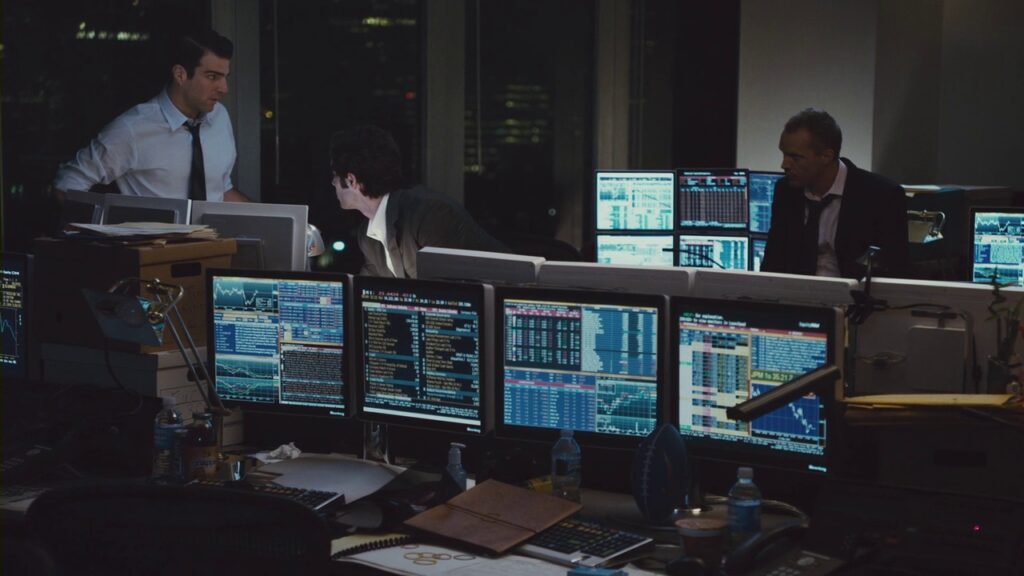
Traders exist for several key reasons that contribute to the efficiency and functionality of financial markets. Here are the main reasons for their existence:
1. Price Discovery
Traders play a critical role in determining the fair market value of assets, such as stocks, bonds, commodities, and currencies. By buying and selling these assets based on new information, trends, and market sentiment, traders help establish the price at which a particular asset should be bought or sold. This process is essential to ensure that prices reflect the true value of an asset in real-time.
2. Liquidity Provision
One of the main functions of traders is to provide liquidity in the market. Liquidity refers to the ease with which an asset can be bought or sold without affecting its price too much. Traders ensure that there is always a buyer or seller available, enabling the market to function smoothly. This is especially important in less liquid markets, where large trades could otherwise cause dramatic price shifts.
3. Efficient Allocation of Capital
Traders help to allocate capital efficiently across the economy. By facilitating transactions and buying and selling based on information and analysis, they help direct resources (money) to companies, industries, and sectors that are most likely to generate returns. In doing so, traders contribute to the overall health of the economy by ensuring that investments flow to the most promising opportunities.
4. Risk Management and Hedging
Traders also engage in risk management by helping other market participants hedge their exposure to various risks. For instance, commodities traders might allow farmers to hedge against the risk of price fluctuations, while financial traders might help corporations hedge against currency or interest rate risk. By providing these hedging opportunities, traders contribute to overall market stability.
5. Market Efficiency
Traders contribute to market efficiency by processing new information quickly and adjusting asset prices accordingly. Through their continuous buying and selling, they help ensure that markets remain efficient, meaning that prices reflect all available information. This efficiency leads to more rational decision-making for investors and other participants in the market.
6. Arbitrage Opportunities
Arbitrage is the practice of taking advantage of price differences in different markets. Traders exist to exploit these price discrepancies, ensuring that the prices of similar or identical assets are aligned across markets. This not only allows traders to make profits but also helps to correct inefficiencies in the market, contributing to overall price stability.
7. Market Sentiment and Confidence
Traders can influence and reflect market sentiment through their actions. When traders buy a stock, for example, it can signal to others that there is confidence in the company, encouraging more investors to enter the market. On the other hand, a sell-off may signal a lack of confidence or concerns about the future performance of an asset. Traders, by making their actions visible, help shape overall market sentiment and confidence.
8. Speculation
Traders also engage in speculation, which involves taking on risk to profit from anticipated price movements. While speculative trading can be controversial, it is an essential part of the market, as it contributes to liquidity, price discovery, and efficient market functioning. Speculators often take positions based on expectations about future events, and by doing so, they help integrate diverse opinions and data points into the market, making it more resilient and dynamic.
9. Enhancing Market Depth
Traders create market depth by constantly placing buy and sell orders, ensuring that there are multiple prices at which transactions can occur. This added depth ensures that markets can absorb large trades without major price fluctuations, maintaining stability even in times of volatility.
In summary:
Traders exist to facilitate the functioning of financial markets by ensuring price discovery, liquidity, efficient capital allocation, risk management, and overall market stability. While traders may sometimes be seen as seeking personal profits, their activities collectively help to create an efficient, dynamic market that benefits both investors and the broader economy.
The Humanity Behind Traders

Although the movie depicts traders as tough and highly skilled, they are still governed by emotions and a sense of morality. It’s also fascinating to observe that for them, getting fired often marks the end of their career, whereas for those in regular jobs or individuals with unique skills, people may actively pursue them, giving them more opportunities.
Interestingly enough, in this movie greed seems to be more a question of survival and practicality than really being manipulative and moral less.

One interesting aspect is that the higher the position, the more skill is required to make tough decisions that will ultimately be responsible for the life of many people down the line. The more someone remains unfazed, the higher their chances of climbing the food chain.
In The Big Short, for instance, it appeared that the traders had little regard for the lives of ordinary people, focusing solely on shorting positions for financial gain and even celebrating the bankruptcy of countless citizens. It almost seemed as if these packages were intentionally created to fail, allowing them to profit as much as possible before the collapse, which didn’t seem to be the case in this movie. In this Margin Call it’s almost like an uncontrollable machine that everyone has to react to.
In short, the traders in Margin Call may seem to lack fulfillment because their work is driven by financial motivations and high-stakes risks, leaving little room for personal connection, emotional satisfaction, or creative expression, as shown in the final scene, Sam Rogers is disconnected from his personal life, with the only connection being the dog that has since passed away and a wife that has since remarried.
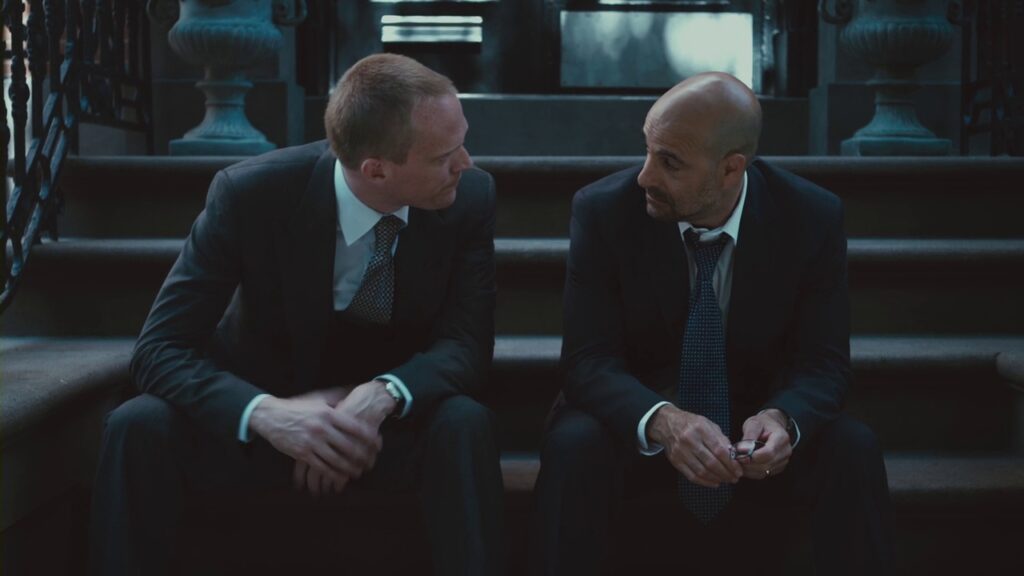
That’s why in Margin Call, we never see the traders in a personal setting—at home, on vacation, or doing anything that reveals their lifestyle beyond material wealth. They are constantly at work or on the way to fulfill a task. The closest we get to seeing someone in a home environment is Eric Dale, who essentially got laid out, and was a former engineer, who also comes across as the most human of them all.
That’s how money operates—it keeps you constantly chasing after it, gradually stripping away your humanity in the process.

Sam Rogers burying his dog at the end of Margin Call could symbolize the loss of his last connection to genuine emotion and humanity. The dog, often seen as a symbol of loyalty and companionship, could represent the remaining piece of Sam’s personal life that still holds emotional value.
As he buries it, it may signify him burying the last vestiges of his empathy, tenderness, or human connection, fully surrendering to the cold, impersonal world of high-stakes finance. It’s a poignant moment that highlights his detachment and the toll that his career and the financial world have taken on him.


GIPHY App Key not set. Please check settings